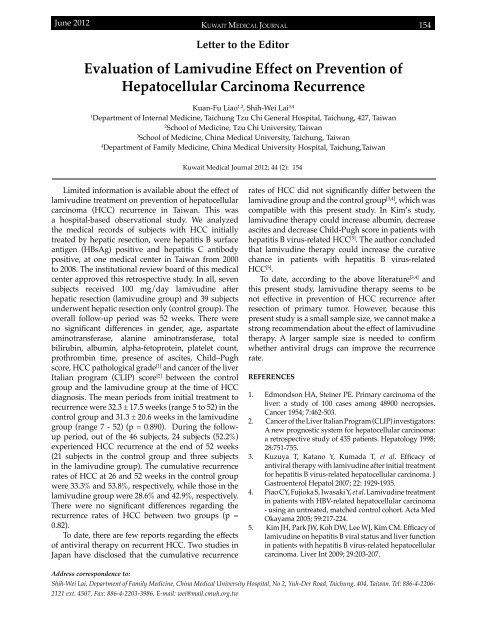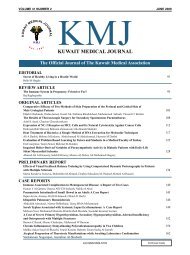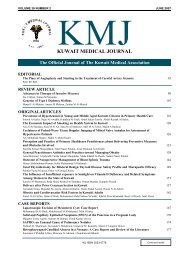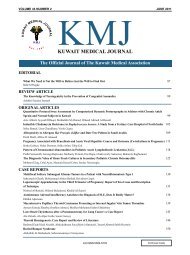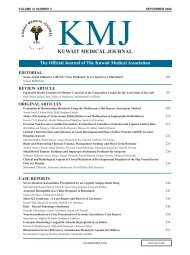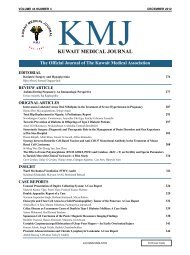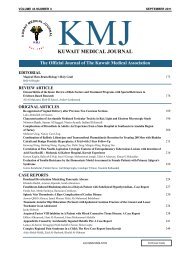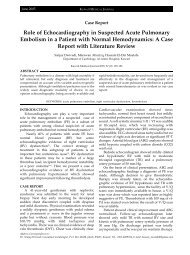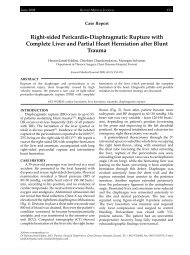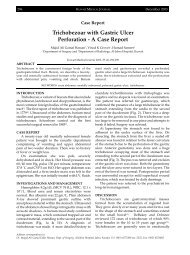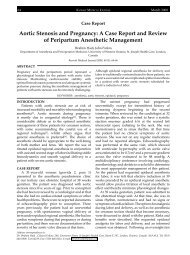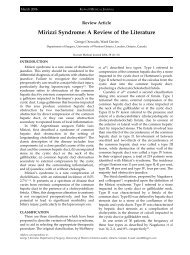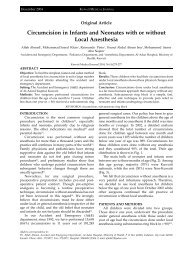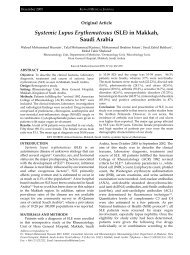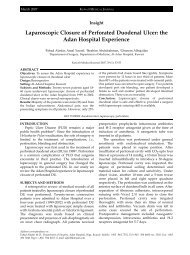Vol 44 # 2 June 2012 - Kma.org.kw
Vol 44 # 2 June 2012 - Kma.org.kw
Vol 44 # 2 June 2012 - Kma.org.kw
You also want an ePaper? Increase the reach of your titles
YUMPU automatically turns print PDFs into web optimized ePapers that Google loves.
<strong>June</strong> <strong>2012</strong><br />
KUWAIT MEDICAL JOURNAL 154<br />
Letter to the Editor<br />
Evaluation of Lamivudine Effect on Prevention of<br />
Hepatocellular Carcinoma Recurrence<br />
Kuan-Fu Liao 1,2 , Shih-Wei Lai 3,4<br />
1<br />
Department of Internal Medicine, Taichung Tzu Chi General Hospital, Taichung, 427, Taiwan<br />
2<br />
School of Medicine, Tzu Chi University, Taiwan<br />
3<br />
School of Medicine, China Medical University, Taichung, Taiwan<br />
4<br />
Department of Family Medicine, China Medical University Hospital, Taichung,Taiwan<br />
Kuwait Medical Journal <strong>2012</strong>; <strong>44</strong> (2): 154<br />
Limited information is available about the effect of<br />
lamivudine treatment on prevention of hepatocellular<br />
carcinoma (HCC) recurrence in Taiwan. This was<br />
a hospital-based observational study. We analyzed<br />
the medical records of subjects with HCC initially<br />
treated by hepatic resection, were hepatitis B surface<br />
antigen (HBsAg) positive and hepatitis C antibody<br />
positive, at one medical center in Taiwan from 2000<br />
to 2008. The institutional review board of this medical<br />
center approved this retrospective study. In all, seven<br />
subjects received 100 mg/day lamivudine after<br />
hepatic resection (lamivudine group) and 39 subjects<br />
underwent hepatic resection only (control group). The<br />
overall follow-up period was 52 weeks. There were<br />
no significant differences in gender, age, aspartate<br />
aminotransferase, alanine aminotransferase, total<br />
bilirubin, albumin, alpha-fetoprotein, platelet count,<br />
prothrombin time, presence of ascites, Child–Pugh<br />
score, HCC pathological grade [1] and cancer of the liver<br />
Italian program (CLIP) score [2] between the control<br />
group and the lamivudine group at the time of HCC<br />
diagnosis. The mean periods from initial treatment to<br />
recurrence were 32.3 ± 17.5 weeks (range 5 to 52) in the<br />
control group and 31.3 ± 20.6 weeks in the lamivudine<br />
group (range 7 - 52) (p = 0.890). During the followup<br />
period, out of the 46 subjects, 24 subjects (52.2%)<br />
experienced HCC recurrence at the end of 52 weeks<br />
(21 subjects in the control group and three subjects<br />
in the lamivudine group). The cumulative recurrence<br />
rates of HCC at 26 and 52 weeks in the control group<br />
were 33.3% and 53.8%, respectively, while those in the<br />
lamivudine group were 28.6% and 42.9%, respectively.<br />
There were no significant differences regarding the<br />
recurrence rates of HCC between two groups (p =<br />
0.82).<br />
To date, there are few reports regarding the effects<br />
of antiviral therapy on recurrent HCC. Two studies in<br />
Japan have disclosed that the cumulative recurrence<br />
rates of HCC did not significantly differ between the<br />
lamivudine group and the control group [3,4] , which was<br />
compatible with this present study. In Kim’s study,<br />
lamivudine therapy could increase albumin, decrease<br />
ascites and decrease Child-Pugh score in patients with<br />
hepatitis B virus-related HCC [5] . The author concluded<br />
that lamivudine therapy could increase the curative<br />
chance in patients with hepatitis B virus-related<br />
HCC [5] .<br />
To date, according to the above literature [3,4] and<br />
this present study, lamivudine therapy seems to be<br />
not effective in prevention of HCC recurrence after<br />
resection of primary tumor. However, because this<br />
present study is a small sample size, we cannot make a<br />
strong recommendation about the effect of lamivudine<br />
therapy. A larger sample size is needed to confirm<br />
whether antiviral drugs can improve the recurrence<br />
rate.<br />
REFERENCES<br />
1. Edmondson HA, Steiner PE. Primary carcinoma of the<br />
liver: a study of 100 cases among 48900 necropsies.<br />
Cancer 1954; 7:462-503.<br />
2. Cancer of the Liver Italian Program (CLIP) investigators:<br />
A new prognostic system for hepatocellular carcinoma:<br />
a retrospective study of 435 patients. Hepatology 1998;<br />
28:751-755.<br />
3. Kuzuya T, Katano Y, Kumada T, et al. Efficacy of<br />
antiviral therapy with lamivudine after initial treatment<br />
for hepatitis B virus-related hepatocellular carcinoma. J<br />
Gastroenterol Hepatol 2007; 22: 1929-1935.<br />
4. Piao CY, Fujioka S, Iwasaki Y, et al. Lamivudine treatment<br />
in patients with HBV-related hepatocellular carcinoma<br />
- using an untreated, matched control cohort. Acta Med<br />
Okayama 2005; 59:217-224.<br />
5. Kim JH, Park JW, Koh DW, Lee WJ, Kim CM. Efficacy of<br />
lamivudine on hepatitis B viral status and liver function<br />
in patients with hepatitis B virus-related hepatocellular<br />
carcinoma. Liver Int 2009; 29:203-207.<br />
Address correspondence to:<br />
Shih-Wei Lai, Department of Family Medicine, China Medical University Hospital, No 2, Yuh-Der Road, Taichung, 404, Taiwan. Tel: 886-4-2206-<br />
2121 ext. 4507, Fax: 886-4-2203-3986, E-mail: wei@mail.cmuh.<strong>org</strong>.tw


